
When her partner dies, a pregnant young woman finds herself imprisoned on
his mother's country estate.
Review by
Eric Hillis
Directed by: Joe Marcantonio
Starring: Tamara Lawrance, Jack Lowden, Fiona Shaw, Edward
Holcroft, Anton Lesser, Chloe Pirrie

Early on in Joe Marcantonio's directorial debut,
Kindred, his protagonist, Charlotte (Tamara Lawrance) gazes at a bird
trapped in a cage. The cage is fashioned to resemble a doll's house, but
it's a cage nonetheless. It's representative of the mindset of the movie's
antagonist, wealthy landowner Margaret Clayton (Fiona Shaw), and of
the establishment in general, who fail to appreciate why the rest of us
might not want to spend our lives confined in cages of their making, even if
they are gilded.

The gilded cage Charlotte finds herself imprisoned in is the Clayton estate
(named I suspect in tribute to The Innocents director Jack
Clayton). Charlotte was in a relationship with Margaret's veterinarian son,
Ben (Edward Holcroft), when he was tragically killed by the out of
control horse he was attempting to treat. Just days before his death, Ben
had angered his mother by revealing his plans to emigrate to Australia with
Charlotte, an idea which Margaret viewed as an affront to nine generations
of Claytons. There's another revelation in the days leading to Ben's death -
Charlotte is pregnant with his child, despite being on the pill and having
no wish to bring a sprog into the world.
Following an angry confrontation with Margaret in the immediate aftermath
of Ben's death, Charlotte faints, waking up a couple of days later in a bed
in the Clayton home. Thomas (Jack Lowden), Margaret's creepily
attentive step-son, informs Charlotte that he's visited her home and brought
all her belongings so she can stay under the watchful eye of himself and
Margaret. When Charlotte expresses her desire to return to her own home, she
is told that the property has been sold, due to Ben's debts. Suspiciously,
her mobile phone is broken, but Thomas promises to have it repaired the next
time he's in town.

Under the proviso of doing what's best for the child, Margaret and Thomas
begin a campaign of attempting to gaslight Charlotte into believing they
have her best interests in mind. But here's the thing about
Kindred - they just might be genuine in this regard. Where
other gaslighting thrillers make it clear what their villains are up to,
nothing is so clear cut in Marcantonio's film. As played by Shaw, Margaret
is a terrifying and intimidating presence, but there are also moments where
she displays a vulnerability, and we learn at one point that she was a
victim of controlling abuse herself in the past. Thomas behaves like a
genuinely nice guy, but in that unsettling way "nice guys" have of creeping
us out - is he up to no good, or are we simply so cynical a society that we
can't accept that some people might just be well meaning? When Charlotte
attempts to strike back, we find ourselves falling into the trap of worrying
about the health of the child she's carrying rather than her own freedom. In
this manner, Kindred is the best type of gaslighting thriller,
one that gaslights the audience along with its heroine.
Equally nuanced is the issue around Charlotte's autonomy regarding the
child she's carrying. Initially she wants rid, but even Ben undermines her
in this regard, and following his death she seems to warm somewhat to the
idea, possibly feeling she owes it to his memory to have his child. If the
movie appears to begin as an allegory for the selfishness of the pro-life
crowd, it morphs into something else, as by the final act Charlotte is fully
determined to have the child, but on her own terms. Is Charlotte's change of
mind spurred on by the idea that Margaret believes her an unfit mother? By
having the child, is Charlotte coalescing to Margaret's wishes or acting in
defiance? Has she become a victim of reverse psychology? Marcantonio doesn't
give us any easy answers here.

In this era of mechanical jump scares and CG, Kindred is a
rare performance driven horror movie, and what performances! Relative
newcomer Lawrance is quite a find, comfortable across the final girl
spectrum that requires a performer to go from shrinking mouse to angry
lioness, and her facial reactions to the ongoing absurdities of her
confinement inject some necessary comic moments to allay the tension. Lowden
is brilliant as the ambiguous Thomas, his pleasant countenance rarely giving
away the character's true intentions, and the confusion regarding whether
he's on Charlotte or Margaret's side helps us to empathise with Charlotte's
tortured and paranoid psychological state. It's the veteran Shaw who gets
all the big moments, delivering a powerhouse performance of the sort that
would be gifted awards recognition were there not an ongoing snobbery
towards genre fare (during an extended monologue, Marcantonio wisely keeps
the camera trained on Shaw, her facial expressions taking us on a journey
along with the words). In Margaret, herself and Marcantonio have created one
of the most interesting antagonists of recent times, one who scares the
bejeesus out of us while occasionally causing us to drop our guards and feel
a smidgen of sympathy for a woman who knows herself what it's like to be a
victim.

